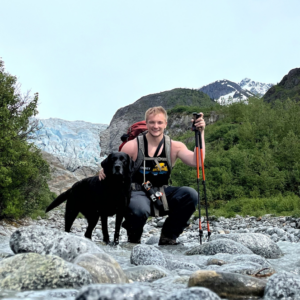Boise State University’s online Bachelor of Science in Advanced Medical Imaging brought a return to higher education into focus for Connor Fulton.
“I knew I wanted to finish a bachelor’s degree,” he said. “I knew that Boise State used to offer an imaging sciences degree, but I heard there was a new advanced medical imaging program where you pick a modality and pursue it. That sounded great.”
Fulton, a computed tomography and x-ray technologist at Bartlett Regional Hospital in Juneau, Alaska, chose the magnetic resonance imaging (MRI) modality.
“At the time, I had just finished computed tomography training. I thought I would train in MRI, but there weren’t any options to do so at work. I suggested [to my boss] going to school and doing clinical hours in my free time.”
So, Fulton completed the online bachelor’s degree in a little more than 12 months at one state capital city while living in another.
“One of my former peers was pursuing the imaging sciences degree at Boise State, so that’s initially how I found out about it,” he said. “It was very manageable. The time change was a little difficult, and I did the degree on top of work, as well. It was a good, flexible program.”
The return on investment was immediate for Fulton, who graduated from the online bachelor’s degree program in May 2024.
“Many of the technologists that I have met throughout my career have been trained on the job, and while their knowledge of procedures and anatomy is extensive, they often do not fully understand the physics and instrumentation behind magnetic resonance imaging,” he said.
“The advanced medical imaging program at Boise State has given me substantial knowledge of the fundamentals behind MRI, which has paid dividends when it comes to problem-solving technical issues and adjusting extrinsic parameters during imaging procedures.”
New frontiers
Fulton is from Sitka, Alaska, a short flight, or ferry ride, from Juneau. He graduated from the University of St. Francis in Fort Wayne, Indiana,

in 2021 after taking prerequisites at the University of Alaska Anchorage.
“I knew I wanted to do something in health care, but I wasn’t exactly sure what,” he said. “I picked radiology because it was a two-year program. I wasn’t sure if it would be something I liked.
“Once I finished my radiography degree, I started working. Within a year, I trained in computed tomography. The year after that, I trained in MRI. That’s the nice thing about this field — you can pick and choose where you want to go.”
Introduction to Sectional Anatomy was one of Fulton’s favorite courses in the program, although he had previous real-world experience in the area. He enjoyed several other courses.
“I’m not great with physics, but the way they taught complex physics of MRI was digestible and interesting to me. The principles courses were fun. Pathophysiology was a cool course, as well.”
The information Fulton learned in the program is applicable to his current role, adding greater value to the degree.
“It not only covered the history of MRI, but also kept things current by informing us of new technologies and software that may be observed in the field sooner than later,” he said.
“In this way, I plan to maintain a lifelong commitment to learning and understanding this new technology as it develops, which is a trait that was most certainly fostered throughout my education here at Boise State.”
Capital gains
Fulton, who enjoys spending his free time backpacking and exploring the outdoors, believes that discipline is key to being a successful online student.
“You have to be self-motivated and keep yourself in check,” he said. “Nobody is going to do that for you. It’s important to read and take notes, even though nobody is making you do so. This program was thorough and executed well compared to other online coursework I’ve experienced.”
During his time in the online Bachelor of Science in Advanced Medical Imaging program, Fulton had a solid support system in place. He also credits the Boise State faculty members for their passion for the medical imaging field.
“My co-workers at the hospital not only trained me in MRI through my clinical experience, but also enabled me to pursue this degree in the first place,” he said.
“It was not an easy decision for them to allow me to spend some of my work time pursuing this degree. I am grateful for the opportunities they have provided for me each and every day that I come into work. I owe them a debt that I can never truly repay.”
Fulton isn’t sure which direction he will go now that he has a degree, but he looks forward to seeing what the future holds.
“It will open up opportunities — especially in terms of administration or career advancement,” he said. “I’m not sure where I want to take things yet, but having a bachelor’s degree will be good for my career. I might join the military or pursue something in medical school.”
The ability to earn a bachelor’s degree without stepping foot on Boise State’s campus was especially impressive to Fulton.
“Future generations of technologists will be multi-modality technologists, and perhaps they will also all be required to graduate with a bachelor’s degree,” he said. “Boise State has allowed me to get ahead of this trend by completing my education and clinical experience from rural Alaska. It is simply amazing to live in a time where such things can be accomplished from nearly anywhere.”
Learn more about advanced medical imaging at Boise State
Want to learn more about the online Bachelor of Science in Advanced Medical Imaging? Join us for an online information session or contact a student success coach.